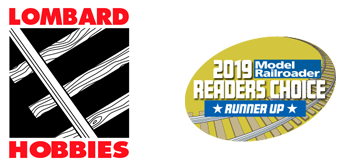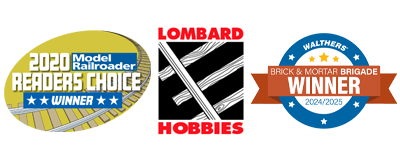ScaleTrains HO
ScaleTrains Rivet Counter HO SXT39238 DCC Ready EMD GP30 Locomotive Conrail 'Can Opener' CR #2245
- In Stock:
- 1
- Scale:
- HO
- SKU:
- SXT39238
Description
Please note picture is representative of the item but may not be same road number. Always refer to product description for actual product details.
ScaleTrains Rivet Counter HO SXT39238 DCC Ready EMD GP30 Locomotive
Conrail 'Can Opener' CR #2245

A new era continues with the Rivet Counter HO Scale EMD GP30. First introduced in 1961, the GP30 would become one of the most-common locomotives on the rails for the next two decades. Our Rivet Counter series model renders the numerous variations of cabs, dynamic brakes, doors, grilles, trucks, etc. Per the prototype and era, we’ve also incorporated LED lighting effects including front, rear, and side walkway lights; ground lights; printed and lighted number boards; and ditch lights.
Road Number Specific ScaleTrains
- New roadname
- Era: mid 1970s to late 1980s
- Series 2200 to 2249, 2198-2199; ex-PRR/PC 2200 to 2251, built 2-5/63
- Fully-assembled
- Multiple road numbers
- Operating LED-illuminated ground lights on both sides of locomotive*
- Operating LED-illuminated “hemisphere” walkway lights on hood ends, and at end of raised walkway duct*
- Operating LED-illuminated front and rear red marker lights with lenses**
- Cab and rear number boards
- Front and rear multiple unit (MU) hose catch boxes
- 4-hose multiple unit (MU) hose clusters with silver gladhands
- Semi-scale coupler buffer equipped with durable metal semi-scale Type E knuckle couplers
- Front and rear straight uncoupling levers with retrofitted switchman grab handles
- As-delivered pilot faces with uncoupling lever loop notches
- Deck-mounted multiple unit (MU) receptacle
- Dummy multiple unit (MU) receptacle mounted to end handrail stanchions
- “Short” stepwells with see-through steps
- Handrail set with center gangway chains
- Front and rear standard drop steps
- Scale sectioned treadplate detail with EMD early “X” style pattern
- 81” GP30 low short hood with ratchet handbrake and square sand fill
- Hinged battery box doors with early hinges and narrow louvers
- Early cab sub-base doors with early hinges
- Front standard EMD LED-illuminated headlight with lenses on number board housing
- GP30 cab with increased length on left (fireman’s) side and inverted cab heater vents
- Detailed cab interior with separate floor, rear wall, seats, and standard AAR control stand
- No cab vents
- Sliding cab side windows
- Tall clear wind wings mounted fore and aft of cab side window on both sides of cab
- No sunshades or sunshade tracks
- Lost-wax brass cast Leslie SU-3L-R horn mounted on right side cab eave
- Large Sinclair Excalibur “ice skate” antenna (communications) mounted on the cab roof
- Accurate hood door and long hood detail
- Late single-panel inertial compartment
- Wire inertial air intake grills
- Tall turbo exhaust stack
- Standard-range dynamic brakes with 48” fan
- Late See-through dynamic brake intake grills with horizontal wires through vertical vanes
- 6-horizontal rib radiator intake grills
- See-through front and rear 48” radiator fan housings with 8-blade fans; 36” pan-top center radiator fan
- Curved radiator fan grab iron
- Square sand fill hatch on top of long hood end
- Rear LED-illuminated horizontal headlight with lenses
- Underbody frame rail with separate plumbing
- Detailed Blomberg-B trucks with Hyatt bearing housings; elliptical springs; end transom detail; separate sanding lines and brackets; and separate swing hanger detail
- Dimensionally accurate truck centers
- Speed recorder mounted to second axle on right front truck sideframe
- Frame-mounted bronze bell
- Prime air filter (can style)
- 2,600-gallon fuel tank with vertical gauges and fuel fill in sill skirt; round gauges in fuel tank sides
- Factory-applied wire grab irons, photoetched lift rings, windshield wipers, trainline hoses with silver gladhands, air tanks, sand hatch covers and more
- Motor with 5-pole skew wound armature
- Dual flywheels
- All-wheel drive
- All-wheel electrical pick-up
- Directional LED-illuminated headlights
- Printing and lettering legible even under magnification
- Operates on Code 70, 83 and 100 rail
- Packaging safely stores model
- Minimum radius: 18”
- Recommended radius: 22”
DCC & sound equipped locomotives also feature:
- ESU LokSound 5 DCC & Sound decoder with “Full Throttle”
- Two (2) cube-type speakers
- 16-cylinder 567D3 prime mover sound
- ESU designed “PowerPack” with two super capacitors***
- Operates on both DC and DCC layouts*****
DC/DCC & sound-ready locomotives also feature:
-
- Operable on DC layouts*****
- DCC-ready with 21-pin connector
* Lighting features operate when using an ESU decoder with appropriate programming while operating using DCC
** Class lights illuminate in white color only in DC operation. Access and changing colors requires an ESU decoder with appropriate programming while operating using DCC
***“PowerPack” feature only compatible with appropriately programmed ESU decoders operating on a DCC layout
*****Lombard Hobbies Recommendation - As modelers ourselves we highly recommend ONLY running DCC on DCC systems and DC on DC systems, regardless of 'Dual-Mode' capability. This gives optimum performance and safeguards the unit from possible damage from running on a different system than originally intended and from any inexperienced operator errors.
Prototype History:
Conrail was formed in 1976 as a means of consolidating several bankrupt railroads into one government-operated system. Key lines of the Penn Central, Erie Lackawanna, and New Haven railroads were combined in an effort to essentially save the struggling railroad industry in the northeast. As a result of the new corporation, Conrail inherited locomotives from its predecessors which included an array of motive power ranging from ALCO, GE, and EMD. Among them was the EMD GP30 of both Pennsylvania and New York Central lineage.
Conrail series 2198 to 2249 was built by EMD from February through May of 1963 for the Pennsylvania Railroad. The locomotives were delivered with Pennsy’s unique “Trainphone” antennas which ran across the top of the carbody and resembled a handrail. The technology was an early two-way radio communication platform that allowed traincrews to speak without using hand signals. Introduced in the mid-1930s, it was revolutionary for its time. However, the technology wasn’t perfect.
One of the major limitations of the Trainphone system was its inability to function in electrified zones. This was because the electric supply and electrical equipment on the locomotive created interference, making communication impossible. Since the PRR's busiest areas were often electrified zones, this was a significant drawback. By the 1960s, the Trainphone system was phased out in favor of traditional radio communication.
While the Trainphones were removed from the GP30s during the Penn Central era, a keen eye could see where the antenna bracket posts once stood. Cut off using a blow torch, shop crews left the bracket plates where they were mounted. The plates can be seen on remaining ex-Pennsylvania Railroad GP30s operating on shortlines like the Indiana Northeastern.
Even with the removal of the antennas, the ex-Pennsy GP30s retained two key spotting features that cast no doubt on their heritage. This included the red marker lights, which Conrail continued to utilize throughout the company’s entire history, along with the cab signal boxes on the engineer’s side of the short hood. The boxes contained conduit for Pennsy’s unique “pulse code cab signaling” system which was developed by the Union Switch & Signal corporation in the 1920s.
Lombard Hobbies - Your #1 Largest Authorized ScaleTrains Select Retailer!









































